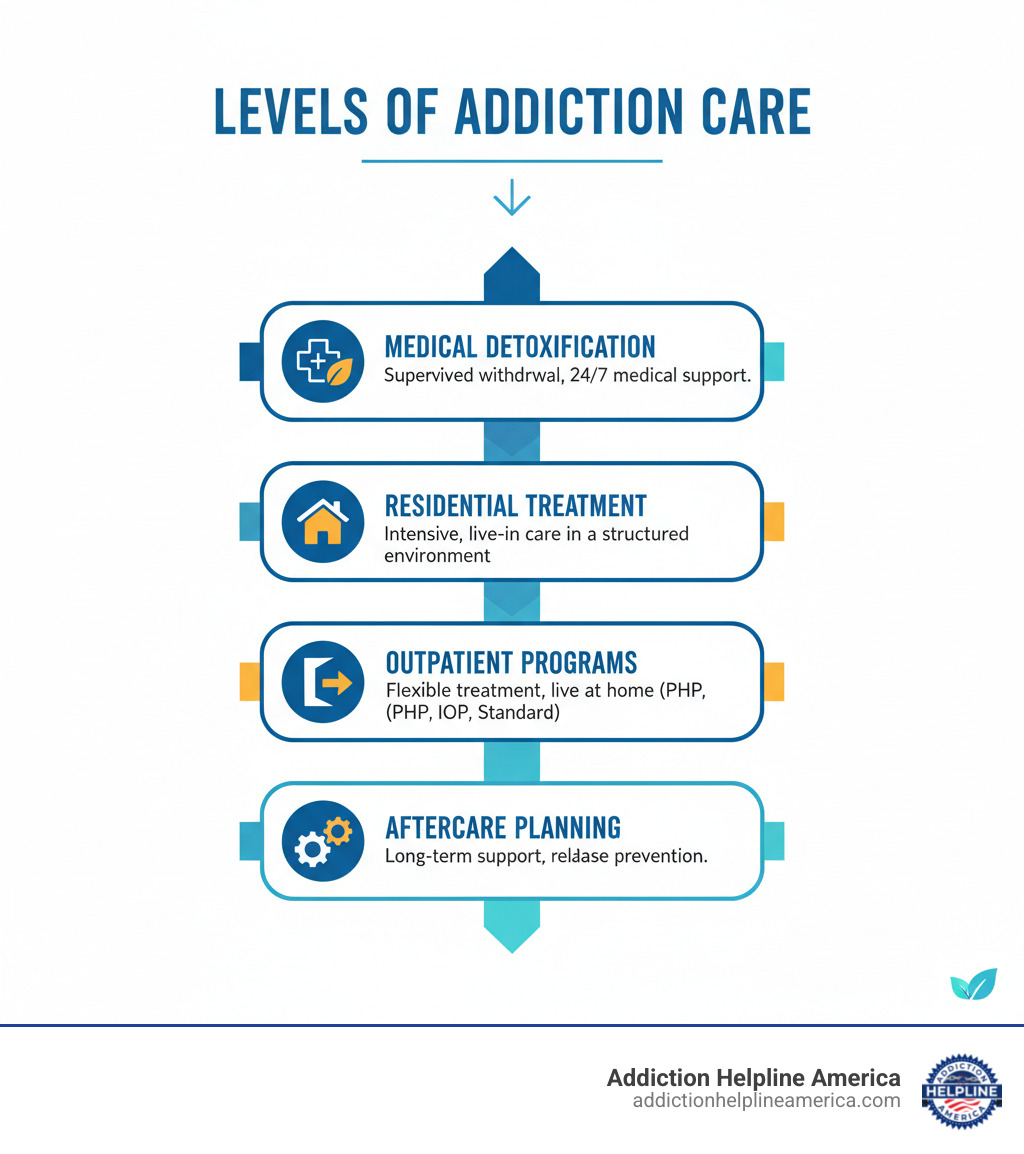
Why Professional Addiction Help Matters for Lasting Recovery
Professional addiction help refers to evidence-based treatment from licensed providers. It addresses addiction as a chronic disease, often alongside co-occurring mental health conditions, through individualized care. This comprehensive support can include medical detoxification, residential or outpatient rehab, evidence-based therapies (like CBT and DBT), medication-assisted treatment (MAT), and aftercare planning.
Addiction is a brain disease, not a moral failing. According to the National Survey on Drug Use and Health, 48.5 million Americans aged 12 or older had a substance use disorder in 2023, yet the vast majority did not receive treatment.
The good news is that recovery is possible. Professional treatment provides the medical expertise and therapeutic support needed to address both the physical and psychological aspects of addiction. While many people recover through various pathways, professional help is a powerful tool, especially for those with severe addiction or co-occurring disorders.
At Addiction Helpline America, we connect individuals with the professional help they need. Our specialists provide 24/7 confidential support and treatment referrals custom to your situation.

Quick Professional addiction help definitions:
Call Now – Your Journey to Recovery Begins Today!

Take the first step towards a healthier life! Call now to connect with our compassionate team and start your recovery journey today. Your path to healing awaits!
Our recovery specialists are available 24/7 to provide support, and all calls are confidential and free. Reach out anytime – we’re here to help!
Understanding the Landscape of Professional Addiction Help
Navigating treatment options can feel overwhelming, but professional addiction help is a spectrum of care designed to meet you where you are. The key is finding the right level of care, which is determined through an individualized treatment plan created by a multidisciplinary team of doctors, therapists, and counselors. This approach ensures your unique history, including any co-occurring mental health conditions like anxiety or depression, is addressed.
Effective treatment is built on evidence-based practices—therapies and medical interventions proven by research to work. Since addiction is a chronic disease that changes brain chemistry, a combination of medical and therapeutic support is essential for healing both body and mind. Organizations like the Mayo Clinic have long recognized addiction as a medical condition, reinforcing the need for professional, evidence-based care.
The Core Components of Treatment
Professional addiction help is structured in levels of care that you can move through as you progress in recovery.
Medical detoxification is often the first step. It provides safe, 24/7 medically supervised management of withdrawal symptoms, which can be dangerous or even life-threatening for substances like alcohol and benzodiazepines.
Inpatient or residential rehab offers the most intensive care, where you live at a facility for 30, 60, or 90 days. This structured, substance-free environment with round-the-clock support is ideal for those with severe substance use disorders, co-occurring conditions, or an unstable home life.
Outpatient programs provide flexibility, allowing you to live at home while attending treatment. These range from Partial Hospitalization Programs (PHP) with daily sessions to Intensive Outpatient Programs (IOP) with several sessions per week, and standard weekly therapy. They are effective for milder SUDs or as a step-down from residential care.
Sober living homes offer a supportive, structured environment for those who have completed intensive treatment but aren’t ready to return home. They help reinforce healthy habits in a community of peers in recovery.
Aftercare planning is a crucial final step that creates a roadmap for long-term success, outlining ongoing therapy, support groups, and relapse prevention strategies.
Here’s how inpatient and outpatient options compare:
| Feature | Inpatient/Residential Rehab | Outpatient Rehab |
|---|---|---|
| Duration | Typically 30, 60, or 90 days, sometimes longer | Varies, from several weeks to months or even years |
| Intensity | High; 24/7 care, structured schedule, intensive therapy | Moderate to high; scheduled sessions, live at home |
| Cost | Generally higher due to accommodation and round-the-clock care | Generally lower, as it doesn’t include living expenses |
| Ideal Candidate | Severe SUDs, co-occurring disorders, unstable home environments, need for medical detox | Milder SUDs, stable home environment, strong support system, step-down care |
The Role of Therapy and Medication
Treatment combines therapy and medication to address the psychological and physical aspects of addiction.

Cognitive Behavioral Therapy (CBT) is a highly effective approach that teaches you to recognize and change the thought patterns that lead to substance use. You’ll learn practical skills to manage triggers and cravings.
Dialectical Behavior Therapy (DBT) is especially helpful for those who use substances to cope with intense emotions. It teaches skills in mindfulness, distress tolerance, emotion regulation, and interpersonal effectiveness.
Medication-Assisted Treatment (MAT) combines FDA-approved medications with counseling. These medications reduce cravings and withdrawal symptoms, making it easier to engage in therapy. For opioid and alcohol use disorders, MAT has been shown to significantly improve recovery outcomes. We can help you Find medication-assisted treatment (MAT).
Different substances require different approaches. Our Cocaine Addiction Recovery: Ultimate Guide provides more specific information. The power of professional addiction help lies in its comprehensive approach, combining therapy, medication, and professional oversight to treat this complex disease from every angle.
Call Now – Your Journey to Recovery Begins Today!

Take the first step towards a healthier life! Call now to connect with our compassionate team and start your recovery journey today. Your path to healing awaits!
Our recovery specialists are available 24/7 to provide support, and all calls are confidential and free. Reach out anytime – we’re here to help!
Professional Treatment vs. Self-Help: What’s the Difference?
While self-help resources and support groups are invaluable, professional addiction help offers a different level of care that is often critical for recovery, especially in severe cases.
The key differences are:
- Clinical Oversight: Professional treatment is delivered by medical doctors and licensed healthcare providers who can diagnose conditions, manage withdrawal safely, and address medical complications.
- Licensed Professionals: You work with certified addiction counselors and therapists trained in evidence-based methods, ensuring you receive high-quality, ethical care.
- Structured Environment: Rehab programs provide a safe, trigger-free environment with a daily routine of therapy and healing activities, which helps build new, healthy habits.
- Addressing Root Causes: Professionals are trained to help you uncover and treat the underlying causes of addiction, such as trauma or co-occurring mental health conditions, which is essential for sustainable change.
Support groups are an excellent complement to professional care, providing community and shared experience, but they are not a replacement for clinical treatment. If you’re concerned about a loved one, our guide on How to Tell if Someone is Using Drugs can help.
The Importance of Professional Addiction Help for Long-Term Success
Seeking professional addiction help significantly improves your chances of lasting recovery, particularly if you have complex needs.
- Treating Co-occurring Disorders: Since about half of people with a substance use disorder also have a mental illness, integrated treatment that addresses both simultaneously is vital. You can’t effectively treat addiction while ignoring the depression or anxiety that fuels it.
- Medical Stability: Professional care ensures your physical safety during withdrawal and addresses the health problems caused by addiction, such as liver damage or nutritional deficiencies.
- Relapse Prevention Skills: You’ll learn evidence-based techniques to identify personal triggers, develop healthy coping strategies, and create a personalized relapse prevention plan.
- Building a Foundation for Recovery: Treatment provides a safe space to develop self-awareness, emotional regulation, and the internal resources needed for a life of sobriety. For example, specialized centers like those at Drug Rehab in Virginia offer this comprehensive support.
The Role of Support Groups and Community
While professional treatment provides the clinical foundation, community is the heart of long-term sobriety.

Peer support from others who understand your struggle reduces isolation and provides hope. This creates a recovery community that offers accountability and friendship.
12-Step programs like Alcoholics Anonymous (AA) and Narcotics Anonymous (NA) provide a structured, spiritual path to recovery that has helped millions. Alternative support groups offer different philosophies for those who don’t connect with the 12-Step model. The key is finding a community that feels right for you.
Many people achieve recovery without formal treatment, but for many others, professional help is the catalyst that makes long-term sobriety possible. Combining clinical expertise with community support offers the best of both worlds. We can help you Find a local support group to build your network.
Specialized Programs for Unique Needs
Effective professional addiction help recognizes that a one-size-fits-all approach doesn’t work. Many providers offer specialized programs for individuals with unique circumstances, such as co-occurring mental health disorders or high-stakes careers, providing custom treatment and improved confidentiality.
Treating Co-Occurring Disorders (Dual Diagnosis)
About half of individuals with a substance use disorder also have a mental health condition like depression, anxiety, or PTSD. This is known as a dual diagnosis, and it requires integrated treatment that addresses both conditions at the same time, by the same clinical team.
Whether substance use is a form of self-medication for mental health symptoms or has triggered them, the conditions become intertwined and must be treated together. This integrated approach dramatically improves recovery outcomes by addressing the root causes of the problem, not just the symptoms. We offer resources on Information on Co-Occurring Disorders and can connect you with local services like New Orleans Mental Health.
Rehab Programs for Executives and Professionals
For doctors, lawyers, pilots, and other professionals, the fear of losing a career or license can be a major barrier to seeking professional addiction help. Specialized rehab programs for professionals are designed to address these unique challenges.
These programs offer:
- Strict Confidentiality: They provide the highest level of privacy, adhering to federal laws like HIPAA to protect your identity and professional standing.
- Targeted Therapies: Treatment addresses the specific pressures of high-achieving individuals, such as burnout, perfectionism, and high-stress environments.
- Career Restoration Support: Many programs offer guidance on navigating licensing board issues and developing a plan to return to work safely and confidently.
The goal is not just sobriety, but helping you restore your career and build the skills to maintain recovery in a demanding professional life. Specialized centers, such as those offering Addiction Treatment in Lexington, KY, can provide this custom support.
Call Now – Your Journey to Recovery Begins Today!

Take the first step towards a healthier life! Call now to connect with our compassionate team and start your recovery journey today. Your path to healing awaits!
Our recovery specialists are available 24/7 to provide support, and all calls are confidential and free. Reach out anytime – we’re here to help!
Navigating Your Path to Recovery
Deciding to seek professional addiction help is a brave first step. The next part—finding, accessing, and paying for it—can seem daunting, but we’re here to simplify the process.
Getting started typically involves a confidential assessment to determine the right level of care for you. It’s also important to verify that any facility you consider is licensed and accredited by organizations like The Joint Commission or CARF. Our Rehab Admissions Hotline is available 24/7 to answer your questions and guide you.
How to Find and Access Professional Addiction Help
There are several clear ways to find the right program:
- Use a National Helpline: The Substance Abuse and Mental Health Services Administration (SAMHSA) operates a free, confidential national helpline at 1-800-662-HELP (4357). They provide treatment referrals 24/7.
- Use an Online Locator: SAMHSA’s FindTreatment.gov is a reliable online tool to search for licensed providers by location, type of care, and payment options.
- Ask for a Referral: Your primary care doctor or a mental health professional can often refer you to trusted local treatment providers.
- Contact Us Directly: For personalized guidance, Contact Addiction Helpline America. Our team knows the treatment landscape and can connect you with reputable centers that fit your needs.
When considering a facility, ask about their treatment philosophy, staff credentials, and success rates. A quality program will be transparent. For more resources, see our Addiction and Rehab Hotlines page.
Understanding Costs and Insurance
Cost should not be a barrier to treatment. There are many ways to make professional addiction help affordable.

If you have health insurance, the Mental Health Parity and Addiction Equity Act requires most plans to cover addiction treatment. The first step is to verify your benefits. You can call your insurance provider or have a treatment center’s admissions team do it for you for free. We can help you understand your Rehab Insurance Coverage, including for specific providers like Ambetter.
If you don’t have insurance, options are still available. Many centers offer sliding scale fees based on income, and state-funded programs provide treatment for those who qualify. Don’t let financial concerns stop you from getting the help you deserve.
Frequently Asked Questions about Professional Addiction Treatment
If you’re considering professional addiction help, you likely have questions. Here are answers to some of the most common ones we hear.
How do I know if I need professional help?
If substance use is causing negative consequences in your health, relationships, work, or finances, it’s time to consider getting help. Professional help is especially important if you:
- Have tried to quit or cut down on your own but couldn’t.
- Experience withdrawal symptoms when you try to stop.
- Need to use more of the substance to get the same effect (tolerance).
- Continue using despite knowing it’s causing harm.
Because addiction is a brain disease, willpower alone is often not enough. Professional support provides the medical and therapeutic tools needed for recovery.
How long does rehab last?
The length of treatment is custom to your individual needs. There is no one-size-fits-all timeline, but here are some general guidelines:
- Medical Detox: Typically lasts 3 to 10 days.
- Inpatient/Residential Treatment: Common program lengths are 30, 60, or 90 days, though some may stay longer.
- Outpatient Programs: Duration is flexible and can range from several weeks to months, depending on your progress.
Research shows that longer treatment durations are linked to better long-term outcomes. The goal is to build a strong foundation for lasting recovery, not to rush through a program.
Can I lose my job for going to rehab?
Fear of losing your job should not prevent you from seeking help. Strong legal protections are in place for employees entering treatment.
- The Family and Medical Leave Act (FMLA) allows eligible employees to take up to 12 weeks of unpaid, job-protected leave for medical reasons, including substance use treatment.
- The Americans with Disabilities Act (ADA) prohibits employers from discriminating against individuals in recovery from a substance use disorder.
This means your employer generally cannot fire you for seeking treatment. Many professional programs can help you steer conversations with your employer and understand your rights. Don’t let fear stand in the way of your health.
Call Now – Your Journey to Recovery Begins Today!

Take the first step towards a healthier life! Call now to connect with our compassionate team and start your recovery journey today. Your path to healing awaits!
Our recovery specialists are available 24/7 to provide support, and all calls are confidential and free. Reach out anytime – we’re here to help!
Conclusion: Take the First Step Today
Recovery is possible. Addiction is a treatable disease, and millions of people build new lives free from its grip. The journey starts with a single, courageous step.
We’ve explored the landscape of professional addiction help, from medical detox and therapy to specialized programs and community support. The resources exist, and the options are available. The most important thing you can do now is take action.
Reaching out for help is a sign of strength. At Addiction Helpline America, our team of addiction specialists is available 24/7 to provide free, confidential guidance. We listen without judgment and connect you with the right treatment program from our trusted network across the nation.
Whether you’re struggling yourself or worried about a loved one, we’re here to help you find a path forward. From addiction treatment in New Orleans to resources in your local area, your story doesn’t have to end with addiction.
Take the first step today. Reach out to Addiction Helpline America, and let us walk this journey with you.
Our helpline is 100%
free & confidential
If you or someone you care about is struggling with drug or alcohol addiction, we can help you explore your recovery options. Don’t face this challenge alone—seek support from us.
Programs
Resources
Will my insurance
cover addiction
treatment?
We're ready to help
Find the best
drug or alcohol treatment
center
Are you or a loved one struggling with addiction? Call today to speak to a treatment expert.















